Huge congrats to our Wang Chuqin, the newly crowned men’s singles World Champion. It’s even more special because he’s the first Chinese left-hander ever to achieve it. With this victory, Wang now holds titles in singles, doubles, mixed doubles, and teams at the World Table Tennis Championships. A WTTC full house. A remarkable milestone in his career.1
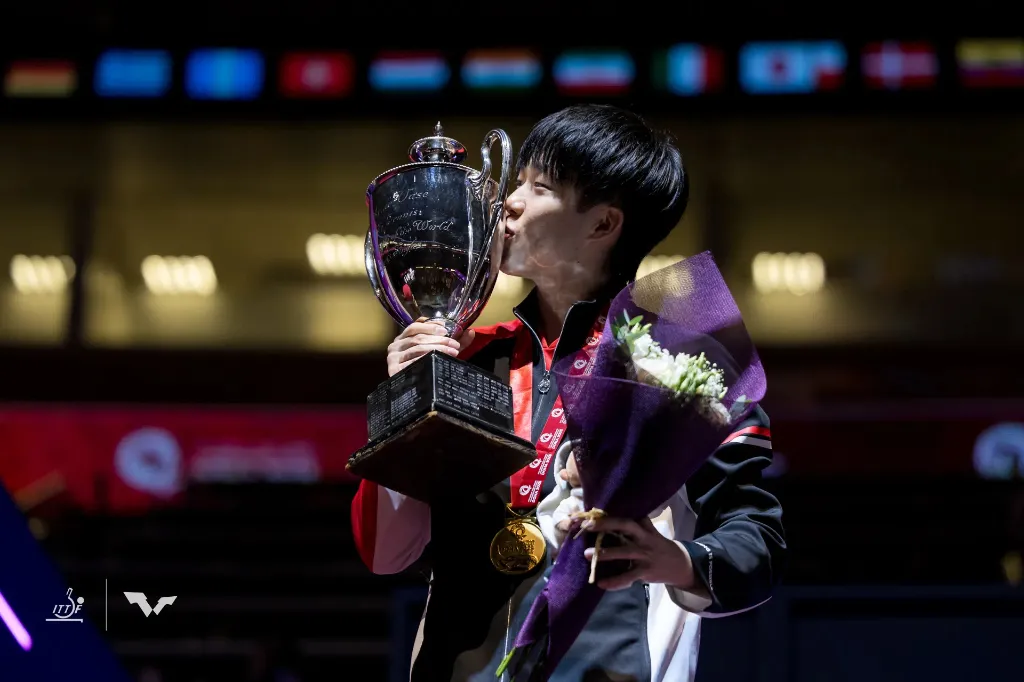
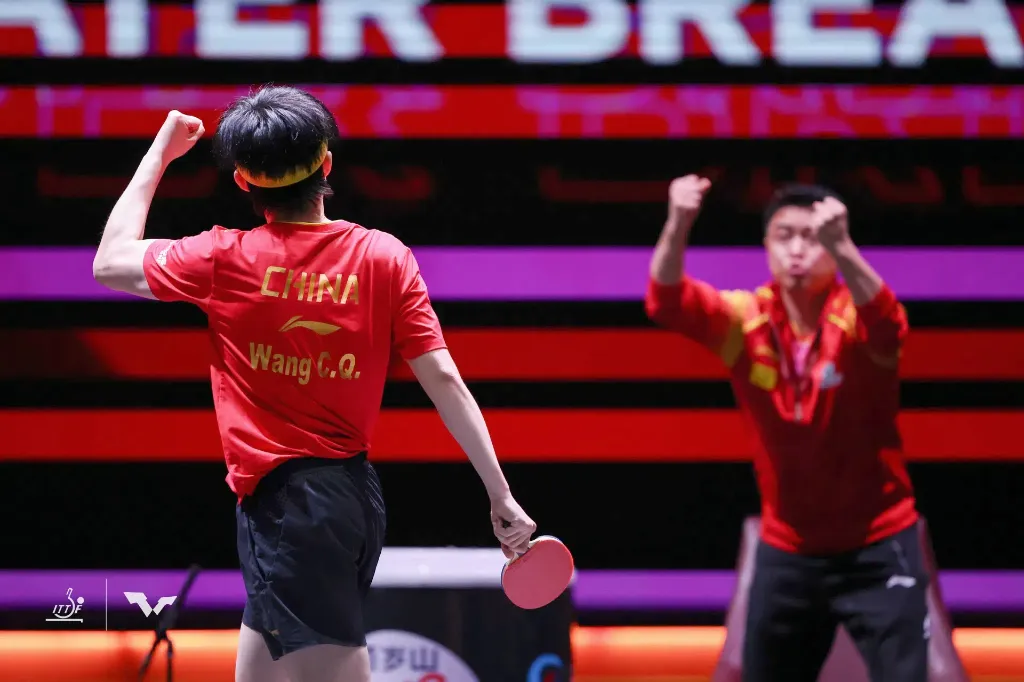
But what stood out most was Wang’s reaction. Calm.
I expected a loud celebration. Maybe the roar from the Olympic team final in Paris, or tears into the towel after beating Ma Long in Durban. But instead, Wang simply looked up and laughed. Then he thumbed back at “China” and “Wang C.Q.” on his shirt, a quiet gesture that spoke for itself. He raised both arms and bowed to the crowd and the team, then jogged over to hug Coach Wang Hao. No dramatics, just a deep breath. The kind you take when a storm has passed.
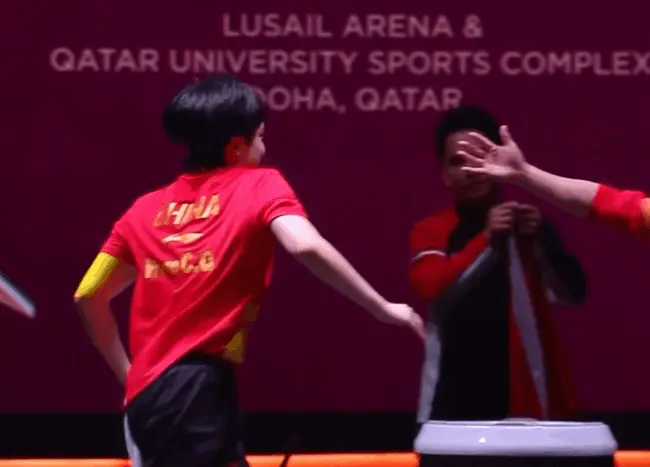
“It’s like a weight I’ve been carrying for years finally lifted off my chest,” Wang said afterward. And that said everything.
Yes, that weight.
It didn’t come out of nowhere. It grew heavier as his teammates fell early in Doha, leaving Wang Chuqin alone to wear China’s color.
It was built with months of public criticism aimed at the Chinese men’s team, poking holes in its dominance. It deepened when veterans like Ma Long and Fan Zhendong stepped aside,2 creating a void in experience and stability for the team.
It swelled during Wang’s post-Olympics slump, when whispers began about whether he could carry the mantle. It pulled harder as millions stood by, hoping he’d break through or fall short again.
And it pressed harder still, because he was chasing a singles title as a left-hander, in a system where left-handers rarely lead.
The closer he got, the louder the noise. The air was suffocating.
I still can’t accept how this kind of pressure has become normalized. Yes, athletes represent their countries. But when did we start expecting one person to carry a nation’s pride on a racket?
Personally, I’ve rarely felt a deep rush of patriotism while watching sports, not even during the Olympics. Jayden hasn’t either. We cheer for athletes like Simone Biles for who they are and what they’ve been through, not the flags they wear. We admire Shohei Ohtani not because he’s Japanese but chose to play in “our land,” but because of his talent and how he carries himself. Does winning or losing really touch our American pride? In this Trump era, honestly, I don’t feel that anymore. 🤦♀️
Anyway, back to table tennis. Let’s walk through Wang Chuqin’s WTTC journey before circling back to how I felt about this win.
(Side note: as usual, we didn’t pay much attention to mixed doubles. Jayden watched all of it, though. I’ll probably write about what mixed doubles means for Wang someday. Just… who knows when.
1. The Climb Through Doha
To win the St. Bride Vase, you’ve got to outlast 127 others. That’s the grind of WTTC.

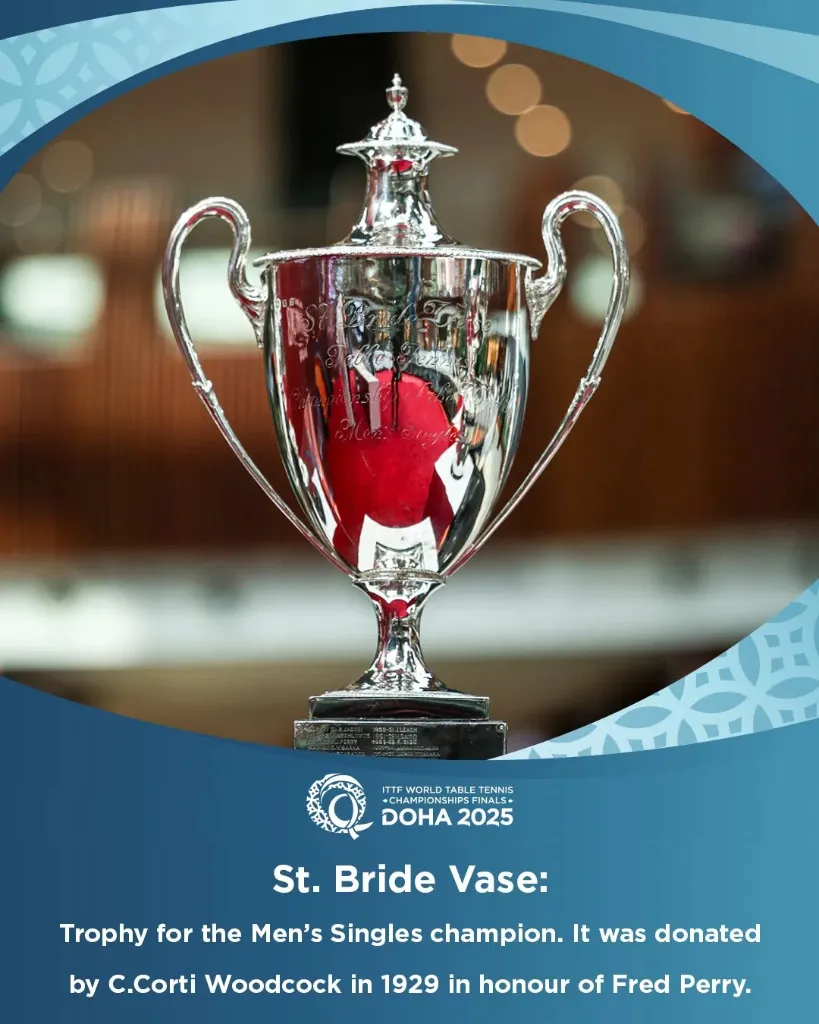
1.1 Early Rounds: Clean Starts, Subtle Signals
Wang Chuqin began with comfortable 4-0 wins over two young players. In R128, Nandan Naresh (US) posed little trouble, though there was a brief dispute over Wang’s toss angle. Wang challenged it, and the TTR system (Hawk-Eye tech) confirmed his toss was 24.67°, well within the 30° limit. Then Leonardo Iizuka (Brazil) showed some promise in R64, but he wasn’t yet at the level Wang, Harimoto, Lebrun brothers, or Lin Shidong had achieved at that age.
Later that day, Wang’s racket got damaged again, right before his mixed doubles match. Thanks to lessons from the Paris Olympics, the spare held up fine, allowing them to advance without issue.
Next came Wong Chun Ting, a familiar opponent and friend. Wong didn’t find an actual opening, and Wang stayed in full control with another clean 4-0. Again, one of Wang’s serves was called. This time, for supposedly tossing outside the end-line, with another successful challenge.
These rulings, confirmed by Hawk-Eye, effectively silenced years of criticism regarding Wang Chuqin’s serve legality. No debate, no drama. Quiet, clear, and final.
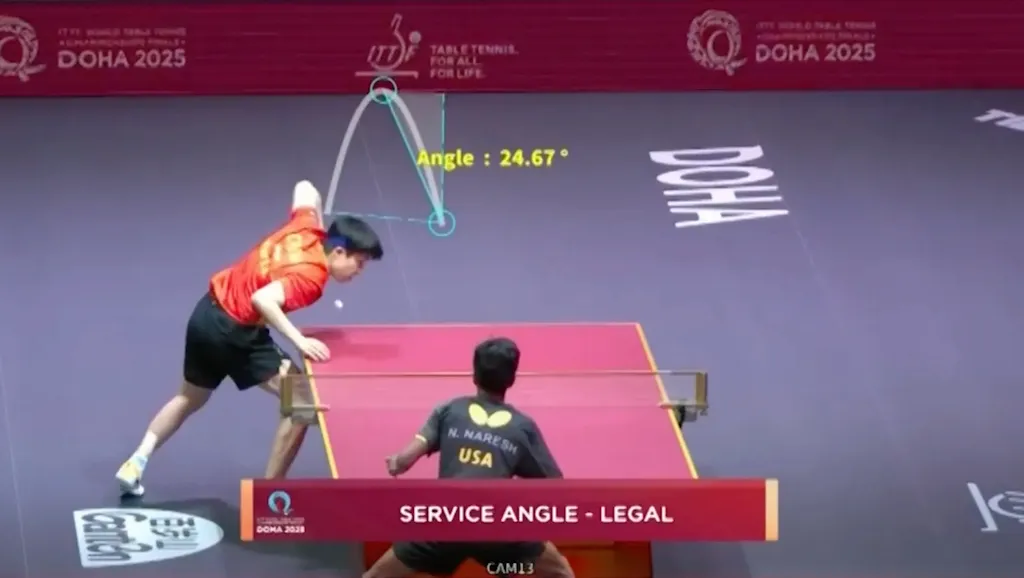
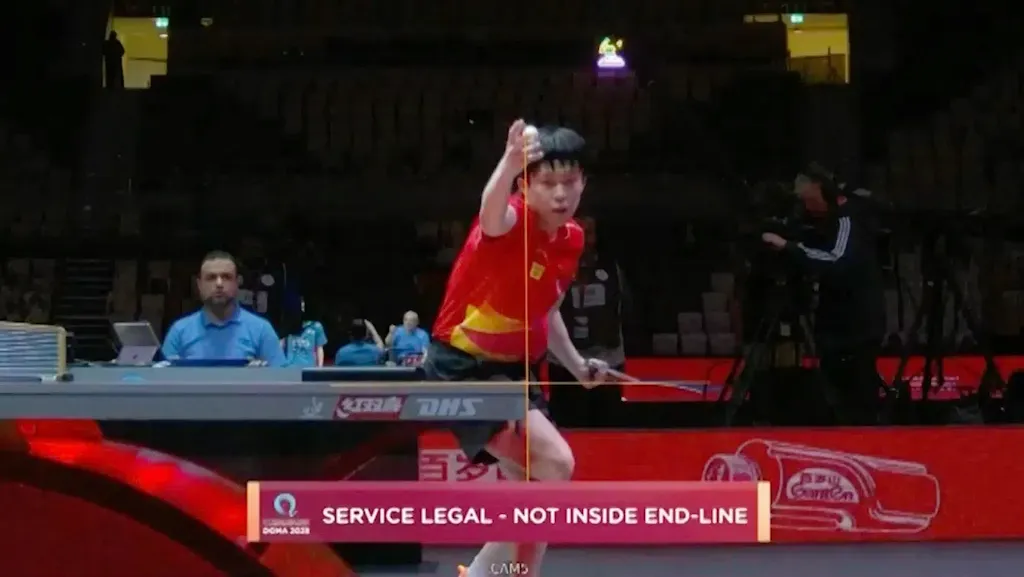
From there on, the matches started getting tighter.
1.2 R16 vs Gauzy: Fire and The Reset
Entering the round of 16, Wang Chuqin faced Simon Gauzy, who opened fiercely, going aggressive on every ball with explosive backhand flicks, counters, and skillful lobs. (By the way, lobbing looks interesting. Why doesn’t Wang use or practice it more?)
Wang appeared flat early on, echoing a tight mixed doubles match earlier that day. While Gauzy had a clear game plan. He had already beaten two lefties, Lin Gaoyuan and Anders Lind, earlier in the tournament, and now he pressed hard on Wang’s backhand, closed down the middle, and disrupted his rhythm. It worked. Gauzy took a 2-0 lead.
At that point, something had to change.
Coach Wang Hao brought Wang Chuqin off the court for a shirt change. A symbol of reset. “That was my last chance at survival,” the young Wang later appreciated the old Wang. “Coach gave me a moment to cool my head and clean out the noise.”
From game three on, Wang turned things around. He increased serve variation, tightened short-game control, and focused on precise placement instead of rushing counters. His forehand finally woke up, too, mixing high-spin loops and hard smashes, preventing Simon Gauzy from launching his favored counterattacks. The 11-2 in game three wasn’t a fluke. It signified a complete tactical and mindset comeback.
In the fourth game, Wang built enough lead to withstand Gauzy’s late push. By games five and six, he was in full flow, mixing pace and switching between offense and defense without hesitation. Gauzy began to unravel, losing rhythm and focus. Wang closed out the match 4-2.
“Some of Simon’s shots were incredible and well beyond what I expected to counter,” Wang Chuqin said afterward. “But I caught his mental dips when he led, and took advantage.” At this level, it’s about who stays clear under pressure rather than who starts stronger.
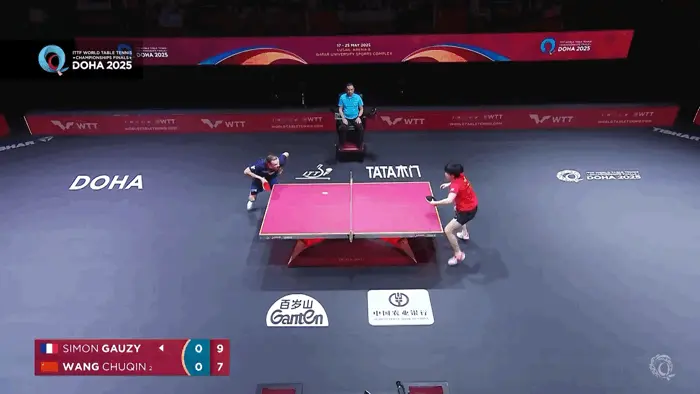
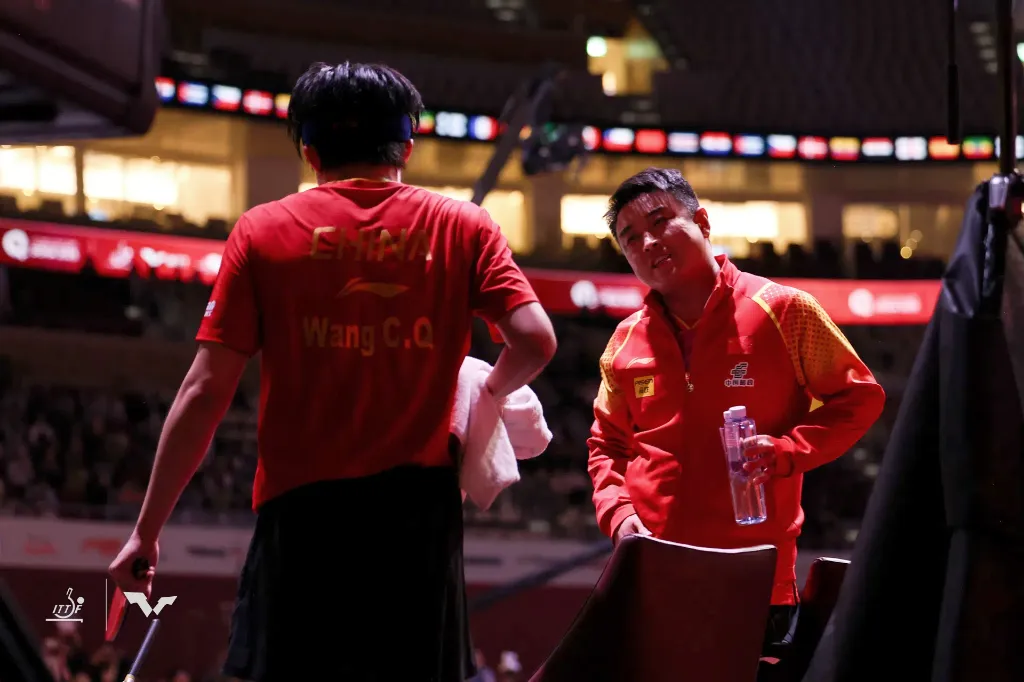
1.3 QF vs Lin Yun-Ju: Outthinking a Mirror
Hours after winning the mixed doubles semifinal, Wang Chuqin stepped into the men’s quarterfinal against his old left-handed rival Lin Yun-Ju. He came in with a clear goal: neutralize Lin’s lethal backhand and control the tempo.
Early on, Wang placed shots to Lin’s forehand to avoid feeding his signature backhand flicks. That forced Lin to respond with awkward strokes. In the short play, Wang was faster and steadier. In rallies, his varied pace and placement pushed Lin onto the back foot.
Score-wise, Wang’s composure shined early. In game one, down 8-10, he surged back to win 12-10. In game two, trailing again at 6-8, he pulled off five straight to take it 11-8. These turnarounds came from cool-headed execution under pressure, and reminded us why he’s carried the label “key point killer” for years.
Later games were tighter, both players trading blows in long tactical battles. Lin pressed hard in the third-ball attack, but faltered in consistency and quality. Wang stayed patient, stuck to the plan, and executed cleanly to finish the match in four games.
After the match, Wang explained he deliberately avoided the kind of slow start that nearly cost him against Gauzy. “I shouted before the match to get myself in,” he said. “We’re on the same level. Every point shifts the mindset. What matters is who calculates better and stays more decisive when it counts.”
Facing someone like Lin Yun-Ju, in Wang’s words, was “a kind of fortunate struggle. It forces you to bring out a better version of yourself.”
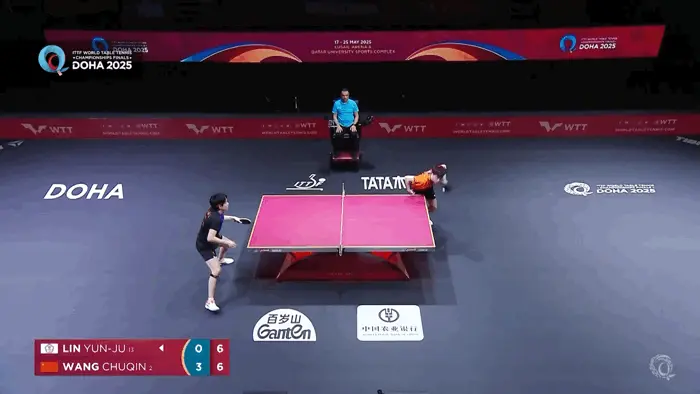
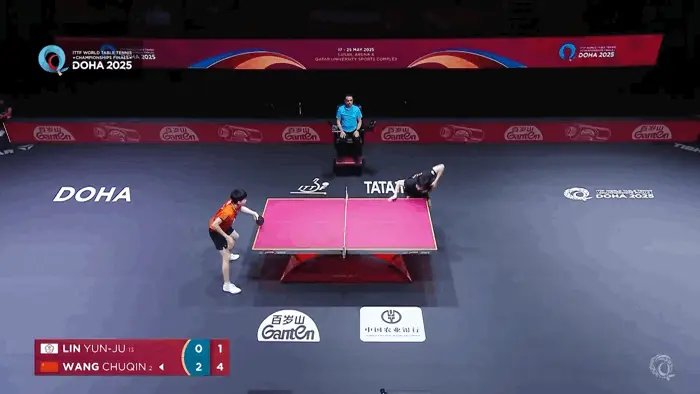
1.4 SF vs Moregard: Shutting Down Chaos
In the semifinal, Wang Chuqin faced Truls Moregard, who brought more variety and unpredictability than Lin Yun-Ju. Moregard often used surprise flicks and blocks in third-ball attacks, combining strong forehands with wide step-arounds. His rhythm disruptions and shot variety made him a dangerous player.
But Wang knew him well. He read Moregard’s serves with ease, kept the short game tight, and attacked quickly to: 1/ Pin Moregard to his backhand and cut off step-arounds, and 2/ Push him off the table to create space for placement shifts.
Wang stayed aggressive from the start and didn’t fall for Moregard’s tricky shots and drama. (Moregard sometimes acts like a drama queen, with fake emotion and little mind games… call it what you want. Funny, but peculiar.) Wang stayed sharp and wrapped up the semifinal 4-1.
“Wang moves so damn well that I can’t reach him,” Moregard told his brother and coach Malte during a timeout.3
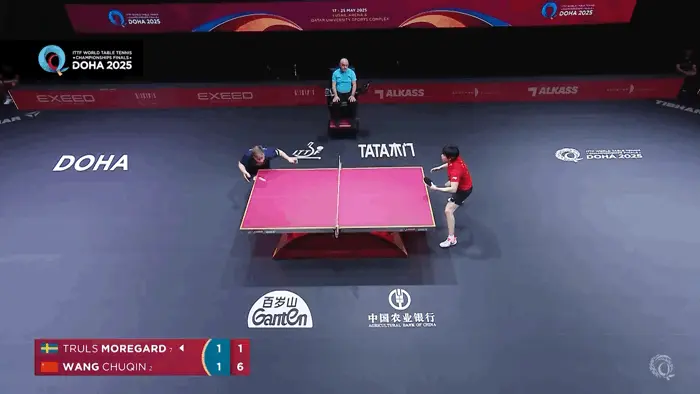
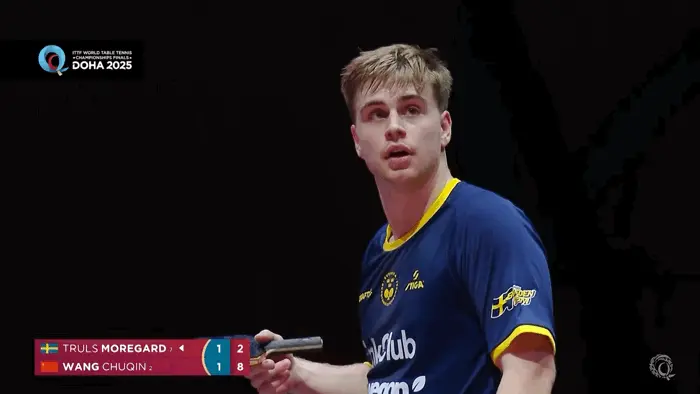
Tactically sharp and creative, Moregard has a real knack for surprises. He’s achieved major results, including silvers at the 2021 WTTC and the 2024 Olympics. But when it comes to facing top-tier opponents, his baseline level and consistency still fall short. (Now that Fan Zhendong has joined Moregard’s club, 1. FC Saarbrücken in Germany,4 maybe he’ll gain the kind of sparring he needs. Time will tell. It will be interesting to see what his next performance looks like. Lol.)
Wang Chuqin’s head-to-head record against Truls Moregard now stands at 11-1. Wang’s only loss came at the Paris Olympics, when he was struggling physically and mentally with off-court issues.
Later that day, Wang teamed up with Sun Yingsha to defend their third mixed doubles crown, beating Maharu Yoshimura and Satsuki Odo. Another layer of history made.5
1.5 Final vs Calderano: The Quiet Answer
Then came the final day in Doha. Wang Chuqin stood alone for China. Across the table was Hugo Calderano, who was on fire, confident, and had beaten Wang just a month earlier at the World Cup.
This time, Wang chose control over firepower. He prioritized control, control, and more control: focused on rhythm disruption, used short serves to Calderano’s forehand to cut off firing openings, and tightened up the short game to force awkward returns.
Unlike in the World Cup, Wang avoided rushing into backhand duels. He slowed things down with spin and placement, using tempo changes to shrink Calderano’s counterloop window. His fast step-arounds and deep attacks cracked open Calderano’s backhand defense. That second game, 11-3 in just eight minutes, was the tactical blueprint in full effect.
As the rallies extended, Wang took over the rhythm. He absorbed and redirected pace, stepped in early, and broke timing. Calderano struggled to find clean shots or a stable footing. Even when Calderano pushed back in game three, Wang didn’t flinch. He responded in the fourth by resetting placements, mixing in drop shots, and pulling the momentum back.6
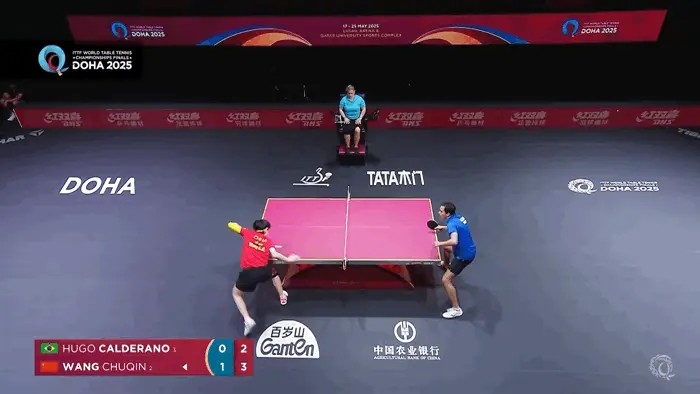
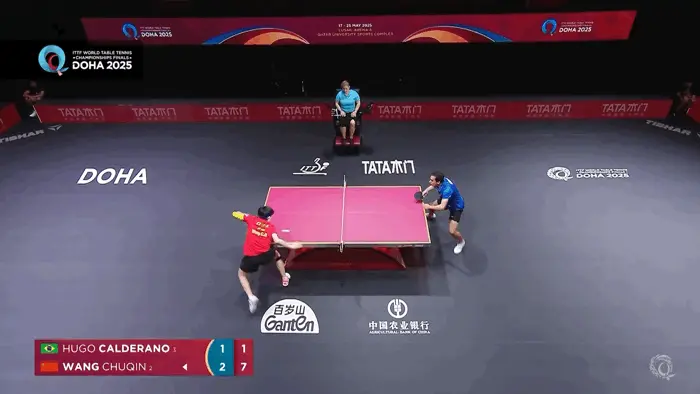
This wasn’t template play. Wang read Calderano’s shifts in real time and responded with clarity. He didn’t rush or overforce, but his attacks were as lethal as ever when the window opened, just more deliberate. It was a calm match that suppressed a player who thrives on rhythm and explosiveness. Even Calderano’s killing diagonals were anticipated and neutralized before they could land.
The tone of the match had been set from game one. Down 7-10, Wang ran off five straight points to steal it 12-10. That changed everything. Calderano grew frustrated, rushing and forcing his shots. Wang stayed unreadable the whole time. No visible emotion, no score reaction.
At match point, Coach Wang Hao reminded him: “Clear. Calm. Decisive. Firm.”
And that’s exactly how it ended.
This was more than a tactical win. It was growth. He didn’t get dragged into a firefight like before. He stopped Calderano quietly, with control instead of noise.
2. Not Revenge, Just Response
2.1 The Revenge Arc That Wasn’t
If you’ve followed Wang Chuqin’s career, you’ve probably noticed something: whenever he loses to someone, he usually beats them the next time. Just like this final vs Calderano. People love calling it a revenge arc, but Wang never frames it that way.
After beating Truls Moregard at the 2024 Fukuoka Finals, just months after Moregard knocked him out of the Paris Olympics, Wang kept it simple: “It’s not about revenge… just another regular match.”7
Still, the pattern has existed for years.
Two weeks after losing to Liang Jingkun at Singapore Smash, Wang swept him 4-0 at the 2025 Asian Cup final. He also shut down Anton Kallberg in Singapore, who had upset him earlier at the 2024 WTT Champions in Frankfurt. Back in 2022, he flipped a loss to Tomokazu Harimoto in the WTTC team event into a win at the WTT Cup Finals Xinxiang in three weeks. Same with Kristian Karlsson. Wang turned a loss at the 2022 WTT Champions in Budapest into payback at the team WTTC months later.
These weren’t revenge fairy tales. They were responses. Wang studied defeats, adjusting, and coming back stronger. This was his way of answering setbacks. Not with noise, but with clarity.
2.2 What It Took to Come Back
Of course, none of that comes easily.
The brutal training behind those moments is hard to imagine. Jayden used to play NCAA baseball, and even he says Wang’s training schedule makes college days look like warm-ups. The Chinese national team is known for staying in camp for most of the year. Some stints stretch into months of closed training camps with probable 16/7 routines. There’s no off-season.
And for a player like Wang Chuqin, the grind is even tougher. He has to stay sharp, stay perfect, and never let up, even when no one is watching. It makes us wonder… how much is too much? When a player starts to look like a machine, and even plays matches in his sleep, like Calderano once joked… it starts to feel more like surviving the system.
Injuries are another part of the picture. We all remember what happened in Paris. In Doha, Wang had Kinesio tape on his shoulder, back, and legs, but didn’t say a word about it. No complaints. No excuses. Other players might spin pain into a story. Wang just gets on with it.
Even though he skipped men’s doubles this year, he still served as a training partner for the doubles squad. From the outside, it looks like the coaching team still hasn’t learned from the past. But somehow I can’t help but think… Maybe the intense training is how Wang deals with the mental pressure. Maybe that’s how he blocks out the noise and keeps his focus. Maybe that’s how the CNT molds its players: “Only those who endure the most get to rise.” That idea’s been there since they were kids.
And the schedule never slows down. In the 2023 WTTC in Durban, Wang made history by reaching three finals and spending the most total time on court. This year, skipping men’s doubles might have helped him physically. But emotionally, the pressure felt heavier than ever. Remember, Wang had long been pinned to the doubles squad as a left-hander. That role has defined him for a long time and basically been his main focus. Without him, a two-time men’s doubles champion, China clearly gave up its shot at defending the title, which caught many by surprise. That’s why Wang had to make up for it by delivering even more in singles and mixed doubles. That’s why he didn’t ease up in training. That’s why he stayed taped up and quiet.
3. Pressure, Expectations, and Empty Rooms
Alright, let’s dig into the pressure.
Every player carries some weight into a major event. But for the Chinese national team, this was something else.
The 2025 WTTC came at a moment when China’s dominance in men’s table tennis no longer looked bulletproof. More and more players around the world had matured, leveled up, and were now strong enough to challenge China’s dominance seriously.
And this time, there were no veterans left to hold the line for the team. Ma Long and Fan Zhendong had stepped back. Head coach Wang Hao put it plainly: “It’s rare that no defending champions lead the team at a WTTC or Olympics. So this time is different and maybe the toughest in the past two decades.”
Without experienced voices to anchor the squad, the pressure fell hard on the younger shoulders.
For months, the team had already been under fire. Fan Zhendong’s unexpected exit in December dropped like a bomb. Fans were shocked, confused, and emotional. Some blamed the system. Others accused the team of failing to provide the level of resources Fan preferred. Rumors flew. Narratives snowballed, even if they didn’t hold up. People mocked the national team’s echelon-based system and questioned whether China’s new generation was strong enough to carry the veterans’ legacy. And all the criticism wasn’t just loud, but relentless.
And standing right in the middle of it all, was Wang Chuqin.
Quiet, taped up, and still training at full speed.
Wang wasn’t the oldest on the roster, but he was the only active male player with Olympic golds. That made him the center of attention by default. The unofficial leader. The one everyone was watching.
But this was only Wang’s third singles appearance at the World Championships. “It usually takes years of experience to claim a WTTC singles crown,” Coach Wang Hao reminded earlier, “Even Ma and Fan didn’t get it done in their first few tries.”
And on top of that, Wang had just lost to Calderano a month earlier at the World Cup. China didn’t win the trophy that time either. So naturally, doubts grew louder. Could he deliver under pressure? Could he carry the team’s hopes and fight for national glory?
No one had the answer. But everyone was watching. Supporters, skeptics, haters. Even the Chinese media was poised to pounce, as always.
How can anyone not feel pressure in a moment like that?
That’s why I said Wang Chuqin’s performance in Doha felt different and more challenging than ever. Once you understand the full context – the recent loss, the criticism, the weight of being the last man standing, the racket incident (again!) – you start to realize how remarkable it was that he stayed calm. That he held himself steady. That he played like a wall while everything around him swayed.
He didn’t just win the World Championships.
He endured it. “Ten-plus days of torture,” in his words, “like a marathon” in silence.
And in the end, he made it look light.
4. The Left-Handed Dream
For Wang, this singles title was more than another piece of his trophy collection.
It was about arrival.
Growing up as a left-handed player in a righty-dominant system, Wang didn’t grow up with the same resources, tailored training, opportunities, or built-in trust that many of his teammates had. He even had nothing to trade for fair treatment. No status, no favors, no connections… just quiet persistence. So he kept adapting. Kept proving. And over time, he carved out space where there wasn’t any.
In doubles, lefties are usually seen as tactical complements to right-handers. That pairing is the expected formula. However, beneath that logic lies a quiet hierarchy. Left-handers are rarely framed as the lead. Rarely developed for singles. That subtle structural bias planted its weight early in Wang’s life. And inside that confusion, something began to take root.
The desire to lead. To stand alone. To prove that left-handers don’t just assist… they can carry.
Wang has admitted he has dreamed of the singles crown since he was young. He had already won all doubles, mixed, and team titles across the biggest stages. But the singles was different. It was personal.
This was for the left-handed players watching. For the next generation who might wonder if they’ll be sidelined, if they’ll have to bend themselves to fit in. Now, they can believe in more. That they could rise, lead, and win on their own terms.
That left-handed path he fought to carve?
It’s real now.
(Read my thoughts on the fate of Chinese left-handers: Wang Chuqin vs. Systemic Bias Against Left-Handers in Chinese Table Tennis)
5. A Sense of Dao: Growth in WTTC
In the post-match interview video, I came across a comment that stuck with me. It said Wang’s performance had a kind of “Dao sense of life” to it. I studied Asian culture in grad school and of course knew what Daoism/Taoism was, but it seemed like a stretch to connect it to table tennis. Through reading and chatting with friends, it began to click.
Daoism is about moving in harmony with the rhythm of the world. Clarity instead of force. Adaptation instead of resistance.8 In table tennis, rhythm is everything. It’s not just about power or speed, but about timing, feeling… about knowing when to hold and when to release, when to push, and when to let the game breathe.
That’s where Wang Chuqin stood out in Doha. His style was still fierce, full of speed and firepower. But it was deliberate, no longer rushed or wasted like it used to be. He didn’t overpower every point. He read them. He flowed with them.
Some say he has shifted from attacker to controller. But to me, it wasn’t a shift. It was an evolution. The speed remained. The power stayed. But the fire burned smarter.
You could feel it in almost every match. His grip on tempo. His timing. When others tensed, he stayed loose. When others swung hard, he let them overextend, then stepped in to turn the tide.
That final wasn’t won in chaos. It was won through control and restraint. Wang absorbed what came at him – pace, spin, aggression, pressure – and turned it into something his own. Something focused and firm.
Even as the last man standing for China, even after the racket incident, and despite the critics and media ready to strike, he remained level and grounded.
That’s presence.
And that’s what makes it feel spiritual. Not in a mystical way, but in the sense that Daoism speaks of. Power through harmony, strength through adaptability, control through awareness.
Maybe that’s why he stayed so calm at the end.
He didn’t just lift another trophy or claim all the glory he deserved. He held something more. Something whole. He absorbed it the way he absorbed everything else. His heart was wide enough to hold it. His mind was still enough to stay inside it.
He moved toward it. With patience, with grit, with clarity.
That calm wasn’t hollow. It held the full journey. Years of pain, training, injury, pressure, bias, doubt, and the quiet fire of a dream that never died.
He climbed, he endured, he arrived.
But he won’t stop.
Bravo, Wang Chuqin.
Read Also
Wang Chuqin: The Road to Growth | CCTV “Face to Face” Interview
Wang Chuqin vs. Systemic Bias Against Left-Handers in Chinese Table Tennis
Wang Chuqin and the Mystery of China’s Coaching System Neglect
The Super Techniques of China’s New Emperor, Wang Chuqin
The TTR System: A Fresh Chapter for Table Tennis Officiating
References
- Historic World Championships in Doha Sets the Stage for Special Centenary in London – ITTF ↩︎
- Ma Long, Fan Zhendong, and Chen Meng Withdraw from ITTF World Rankings – ITTF ↩︎
- Bordtennis: Truls Möregårdh tog strid och räddade fyra matchbollar i VM-semin: ”Står upp” | SVT Sport ↩︎
- Sensation perfekt: Olympiasieger Fan Zhendong schlägt künftig für den 1. FC Saarbrücken Tischtennis auf ↩︎
- Wang Chuqin and Sun Yingsha Make History with Third Consecutive Mixed Doubles Crown – ITTF ↩︎
- Japanese Duo Ends 64-Year Men’s Doubles Drought While Wang Chuqin Becomes the New Men’s Singles World Champion – ITTF ↩︎
- Wang Chuqin Talk in Fukuoka Finals: His Slump & Comeback ↩︎
- Taoist philosophy – Wikipedia ↩︎
Leave a Reply